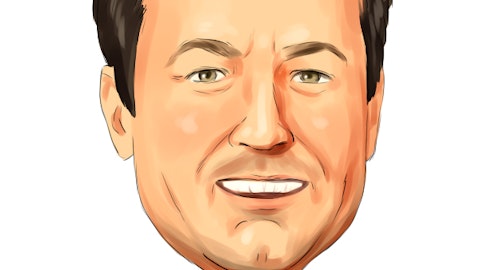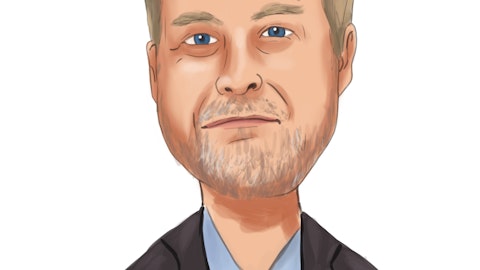John Daniel: Got it. A final question. I think you mentioned in response to a question was a portion of your customers are, in fact, the pressure pumping companies. Did I hear that correctly?
Michael Skarke: On the chemical side. So, Chemical Technologies works for both pressure pumpers as well as direct operators.
John Daniel: Okay. Are you having or seeing any signs of payment issues with any of the smaller pressure pumping companies?
Nick Swyka: No, John, we’re not. Part of the – I circle back to an earlier question there and how low can our DSO get. When we do sell to pressure pumpers that are in turn paid by operators through Chemical Technologies division which has both operators and pressure pumpers as customers, that dynamic there is one of the things that keeps us from getting, call it, below 75 days eventually. However, the payment issues we’re having the same performance that we’ve typically had there. No sign of deterioration. We do work for a lot of very large successful pressure pumpers and they’re paying on schedule.
John Daniel: Yes, I mean I would expect that from them, but you’ve seen a sort of the carnage in the spot frac market. I just didn’t know if those super, super small frac players were having any issues, so that’s the question.
Michael Skarke: Yes, we really don’t do a whole lot with the super small frac players. We have a hard time on that side with the chemistry just given the size of those tickets.
John Daniel: Got it, okay.
John Schmitz: I think it’s fair to say, John, we also don’t do a lot of business with even larger companies that are heavily weighted to spot. We don’t.
John Daniel: Fair enough. Thank you for including me into your time today.
Michael Skarke: Thank you, John.
Operator: Thank you. Next question comes from the line of Jeff Robertson with Water Tower Research. Please go ahead.
Jeff Robertson: Thank you. Good morning. About the revenue split is about 70% completion and 30% production. Michael, do you see that changing over time as companies drill longer laterals? And maybe even if they’re drilling bigger pads, do you see the amount of water that they’ll have to move off locations increasing? And is that an area that will drive your margin opportunity in the water infrastructure business?
Michael Skarke: Yes, I think that’s a good question, Jeff, and there’s really two parts. So we do see continued longer laterals and more water per pad, as I mentioned, with the Endeavour job that we released a couple of months ago. And so that’s certainly an opportunity for us as a water management company and providing the water and managing the water and taking it away. In terms of the split between completion and production, I really look at that a little differently. I do see the production weighting continue to increase, and that’s largely as a result of our focus around infrastructure. I mean that’s really where – as I mentioned, that’s where we’re going to spend a majority of our growth capital for next year. And a good portion of that is going to be related – or really derived from production revenue. And so, I think that’s what’s going to drive a split something more towards a 60/40 in the near term.
Jeff Robertson: Michael, as that increases, I think you alluded to earlier that also could help drag up margins in the water services and maybe even the chemicals business. Is that right?
Michael Skarke: That’s exactly right. We’re really looking to leverage those infrastructure relationships and long-term contracts to provide more opportunities for services and chemistry. And it’s not really a bundling. And bundling is usually a cost-based approach. This is a service logistics-based approach where we can provide the complete solution at the correct price for the customer. I’d refer everyone to what we did in the Haynesville. I mean, we were asked to provide that solution by our customer. It wasn’t a bundled offer. It was the answer they needed, and we were grateful to be able to do it for them.
Jeff Robertson: My last question kind of is a take on that, as you see consolidation in the industry, are you seeing some of your customers who only want to deal with one water company and allow you to put more of your offerings in front of them at a better margin opportunity for Select?
Michael Skarke: Yes, I think John really nailed the question about consolidation and how we think about it. I mean, to your point, there – when you’re working for the largest operators out there, safety, environmental, automation, size, scale, reputation, all of these really matter. And there’s only a few companies that can check those boxes. And fortunately, we’re one of them. And so, we’re not afraid of consolidation. We’re embracing it. We’re proactive. We think it creates opportunities for us on really all three segments, services, infrastructure and chemistry.
John Schmitz: Yes, and I would add on to that. I mean, Nick talked about our efforts in the procurement area for this company. One of the focuses with centralized procurement is to do more with less on the vendor side for us. Our customers are doing the same thing. They’re very much focused on more of a partnership approach, especially in the infrastructure piece. But as it relates to chemicals and water services, they look at that as a value as well to doing business with fewer companies and more strategic value add as we move forward in the area that we’re in, which is this water solutions business.
Jeff Robertson: Thanks for taking my questions.
John Schmitz: Thank you.
Michael Skarke: Thank you, Jeff.
Operator: Thank you. There are no further questions at this time. I would like to turn the floor over to John Schmitz for closing comments.
John Schmitz: Yes, thanks to everyone for joining the call. Thank you for your interest in learning more about Select Water Solutions and we look forward to speaking to you again next quarter.
Operator: Thank you. This concludes today’s teleconference. You may disconnect your lines at this time. Thank you for your participation.
Follow Select Water Solutions Inc. (NYSE:WTTR)
Follow Select Water Solutions Inc. (NYSE:WTTR)
Receive real-time insider trading and news alerts


